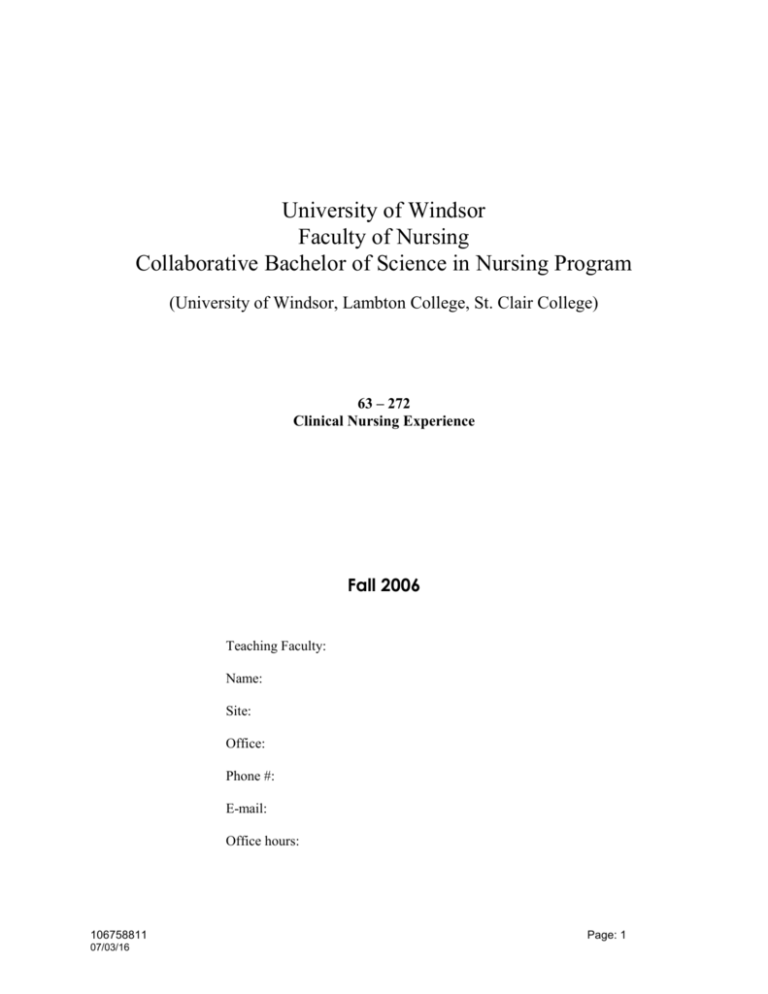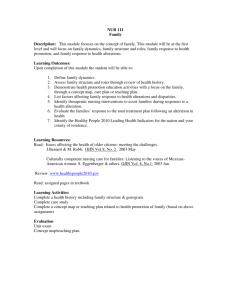Competency Performance Evaluation (CPE)
advertisement

University of Windsor Faculty of Nursing Collaborative Bachelor of Science in Nursing Program (University of Windsor, Lambton College, St. Clair College) 63 – 272 Clinical Nursing Experience Fall 2006 Teaching Faculty: Name: Site: Office: Phone #: E-mail: Office hours: 106758811 07/03/16 Page: 1 63- 272 Course Outline COMPETENCY PERFORMANCE EVALUATION (CPE) OFFICIAL RECORD OF CLINICAL PERFORMANCE Student: Student Number: Clinical Faculty: Clinical Site: Clinical Outcome — Circle one Pass Fail Date: By the end of this clinical experience, the student will be able to perform the designated competencies and all related critical elements listed on the following pages. At midterm, the student will receive a formative evaluation. If there is no opportunity to assess a specific student competency, it is to be left blank at mid-term. All competencies must be evaluated on the final evaluation. Universal Competencies are to be applied throughout the CPE. The following will be considered as not meeting the competency: Safety and Security: A. Physical Safety & Security: Any action or inaction on the part of the student that threatens the patient/client’s well being or violates the patient/client’s physical security. B. Emotional Security: Any action or inaction which threatens the emotional well being of the patient/client or significant others or violates the patient/client’s emotional security. All potential failures to protect the client from harm cannot be described here. The clinical faculty’s judgment is binding in cases of actual or potential harm to a patient/client. The faculty of nursing reserves the right to remove a nursing student from the clinical area at any time, in instances where the instructor has reason to believe that the student is rendering unsafe and/or unethical nursing care. Page: 2 63-272 63- 272 Course Outline Midterm Met Not Met A. Protects the Patient From Physical Harm 1. Identifies client before engaging in any proposed care plan. 2. Protects the patient/client from physical harm at all times Identifies potential safety threats in the clinical setting and proposes solutions for safety. Takes preventative action within any clinical setting — on actual threats to client safety, safety devices are in place. c. Is able, when asked, to state agency safety procedures. d. Follows body substance precautions. a. b. B. Final Met Not Met Protects the patient/client and significant others from psychological harm. a. Uses CNO guidelines for standards of practice, ethical framework, and consent to treatment and nurse/client therapeutic relationship in clinical practice. Page: 3 63-272 63- 272 Course Outline 1. Implement behaviours to promote personal and professional self-development Articulate own evolving philosophy/values of nursing care of young adults and older adults with alterations in health. (Lenburg #5, Bevis — Management/Planned Change) Midterm Final Met Not Met Met Not Met Critical elements/behaviours demonstrating competence at the end of 63-272: 1.1 Analyze own philosophy/values about the care of adults and older adults experiencing episodic and long-term health alterations. 1.2 Using reflective journal analyze how own personal growth as a member of a family has influenced his/her nursing practice. 1.3 Integrate feedback from individual client, families, peers, faculty and other health professionals to set goals to improve own practice. 1.4 Analyze own learning needs, readiness, style and their impact on care of individuals and/or families experiencing episodic and long-term alterations. 1.5 Evaluate own behaviours that document goal achievement against program competencies. Comments: Page: 4 63-272 63- 272 Course Outline 2.Integrate ethical, legal, professional and regulatory parameters into nursing practice Maintain standards of professional practice as they apply to issues of care for selected health alterations (Lenburg #4 & 5, Bevis — Management, Planned Change) Midterm Final Met Not Met Met Not Met Critical elements/behaviours demonstrating competence at the end of 63-272: 2.1 Advocate for the rights of individual clients and/or families in provision of care during episodic and long term health alterations. 2.2 Use the College of Nurses of Ontario Standards of Practice in the care of adults experiencing health alterations. 2.3 Adhere to the policies of the Collaborative Nursing Program and the participating agencies when caring for individual clients and/or families with episodic and long-term health alterations. 2.4 Analyze with assistance ethical dilemmas encountered in the care of individual clients and/or families experiencing long-term health alterations. 2.5 Document client care accurately. Comments: Page: 5 63-272 63- 272 Course Outline 3. Formulate clinical judgments that are based on critical inquiry and analytical reasoning. Formulate clinical judgments based on prevalent episodic and long-term health needs of clients with predictable outcomes. (Lenburg #3, Bevis — Problem Solving) Midterm Final Met Not Met Met Not Met Critical elements/behaviours demonstrating competence at the end of 63-272. 3.1 Use inductive and deductive reasoning to assess and determine health needs. 3.2 Use critical analysis skills to prioritize the needs of individual clients and/or families experiencing episodic and long-term health alterations. 3.3 Use analytical reasoning in collaboration with clients, to generate strategies to promote optimal health. 3.4 Verify evidenced based clinical judgments with clinical faculty and/or health care professionals. 3.5 Analyze own nursing actions that promote optimal health of individual clients and/or families experiencing episodic and long-term health alterations. Comments: Page: 6 63-272 63- 272 Course Outline 4. Integrate nursing and multi-disciplinary knowledge into nursing practice Integrate multidisciplinary theories in the care of clients with episodic and long-term health needs. (Lenburg #8, Bevis — Maturation / Adaptation) Midterm Final Met Not Met Met Not Met Critical elements/behaviours demonstrating competence at the end of 63-272: 4.1 Provide theoretical rationale for all actions taken to promote health of individual adult clients, older adults, and/or families. 4.2 Analyze the factors that contribute to the development of selected episodic and long-term health alterations. 4.3 Apply relevant multidisciplinary theories to the care of individual clients and/or families. Comments: Page: 7 63-272 63- 272 Course Outline 5. Integrate research findings into clinical practice, education and management Utilize evidence based outcomes in nursing practice to promote the optimal well being of clients (Lenburg #3, Bevis — Problem Solving) Midterm Final Met Not Met Met Not Met Critical elements/behaviours demonstrating competence at the end of 63-272: 5.1 Analyze how research is applied in the care of individual clients and/or families experiencing health alterations. 5.2 Use evidenced based practice in the care of individual clients and/or families experiencing health alterations. 5.3 Formulate researchable questions to promote the health of individual clients and/or families. Comments: Page: 8 63-272 63- 272 Course Outline 6. Implement the nursing process to promote, maintain, and restore the health of individuals, families, groups and communities. Apply the nursing process in the nursing care of clients experiencing alterations in health. (Lenburg #1, Bevis — Problem Solving) Midterm Final Met Not Met Met Not Met Critical elements/behaviours demonstrating competence at the end of 63-272: 6.1 Perform holistic health assessment for individual clients and/or families experiencing episodic and long-term health alterations. 6.2 Perform preoperative and postoperative assessments for individual clients and/or families using selected tools. 6.3 Perform gerontological assessments for individual clients using selected tools. 6.4 Perform pain assessment. 6.5 Formulate nursing diagnoses in collaboration with clients and/or families. 6.6 Collaborate with individual clients and/or families to formulate expected outcome criteria. 6.7 Implement interventions that are relevant to the nursing diagnoses identified. 6.8 Administer medications safely following the rights of medication administration. 6.9 Evaluate client outcomes by comparing actual to anticipated outcomes, modifying the plan of care as required. Comments: Page: 9 63-272 63- 272 Course Outline 7. Use the teaching/learning process to promote the health of individuals, families, groups and communities Implement teaching/learning plan to assist clients to effectively deal with alterations in health (Lenburg #7, Bevis — Teaching/Learning) Midterm Final Met Not Met Met Not Met Critical elements/behaviours demonstrating competence at the end of 63-272: 7.1 Collaborate with clients to determine learning needs. 7.2 Determine learning needs of client in preparation for diagnostic procedures and preoperatively. 7.3 Determine client readiness to learn. 7.4 Mutually develop learning goals with individual clients and/or families. 7.5 Implement learning plans based on teaching/learning principles to promote optimal health of clients and or families with episodic and long-term health needs. 7.6 Evaluate the effectiveness of teaching/learning strategies for clients and/or families by comparing actual to anticipated outcomes and modifying the plan as required. Comments: Page: 10 63-272 63- 272 Course Outline 8. Collaborate with clients, their families, communities, and members of the health team and other organizations for the promotion, achievement and restoration of optimal health. Collaborate with the client, families and the health care team in developing strategies to achieve optimal health. (Lenburg #2, #4, Bevis — Communication, Caring) Midterm Final Met Not Met Met Not Met Critical elements/behaviours demonstrating competence at the end of 63-272: 8.1 Use therapeutic and professional communication techniques. 8.2 Respect clients/families and apply the principles of a helping relationship. 8.3 Advocate for the rights of client and family. 8.4 Collaborate with the members of the health team and related agencies to promote optimal health. Comments: Page: 11 63-272 63- 272 Course Outline 9. Integrate leadership and management roles into the delivery of health care Analyze the student’s role as a leader and manager in identifying need for change within a health care agency. (Lenburg #5 & #6, Bevis — Management/Planned Change) Midterm Final Met Not Met Met Not Met Critical elements/behaviours demonstrating competence at the end of 63-272: 9.1 9.2 Demonstrate time and resource management in the care of individual clients and/or families experiencing episodic and long-term health alterations. Analyze the leadership and management roles of nurses in the promotion of optimal health in clients and/or families experiencing episodic and long-term health alterations. Comments: Page: 12 63-272 63- 272 Course Outline 10. Engages in activities to promote the development of the profession of nursing. Explore role of nursing in the delivery of health care to clients with alterations in health. (Lenburg #6, Bevis — Management/Planned Change) Midterm Final Met Not Met Met Not Met Critical elements/behaviours demonstrating competence at the end of 63-272: 10.1 Participate in nursing and other professional discussions in promotion of optimal health of clients and/or families experiencing episodic and long-term health alterations. 10.2 Explore the role of nursing in advocating for the rights of clients and/or families to quality care in a variety of settings. 10.3 Identify factors that enhance or inhibit quality care of clients and/or families in a variety of settings. Comments: Page: 13 63-272 63- 272 Course Outline RECOMMENDATIONS Strengths: Improvement areas: * Level & course # Student’s name Student signature: ID# Date: Midterm Date: Final * Faculty signature: Date: Midterm Date: Final Signature indicates student and faculty have read the evaluation. Page: 14 63-272 63- 272 Course Outline Page: 15 63-272






